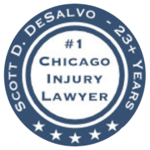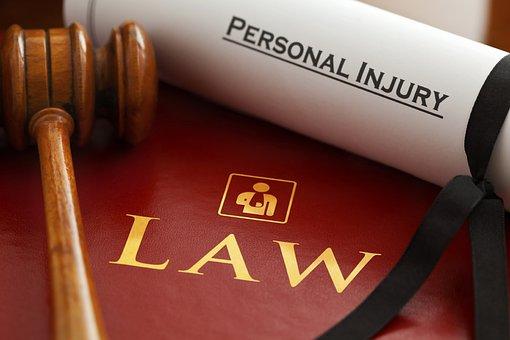




You know what I remember most about my father's injury?
It wasn't just the physical pain he suffered after his accident. It was the 17 years – SEVENTEEN YEARS – that his case dragged on. The way his lawyers treated him like a case number instead of a person. The way they didn't explain things. The way they left money on the table without telling him. And at the very end, after 17 years of waiting, his own lawyer sued him for more fees.
My father's case wasn't about birth injuries. But I think about him every single time a parent calls me after their baby was hurt during delivery.
Because I know what it's like when the people who are supposed to help you – whether that's doctors during delivery or lawyers after an injury – fail you when you need them most.
Like Maria from Lincoln Park.
Maria called me three years ago. She was crying so hard I could barely understand her at first. Her daughter had just been born at one of Chicago's major hospitals. The delivery had been difficult. Really difficult.
Maria knew something wasn't right during labor. She could see the monitors. She could see the baby's heart rate dropping. She told the nurses. She told the doctors. Something was wrong.
"First-time mom jitters," they told her. They dismissed her concerns. They made her feel like she was overreacting.
By the time they finally performed an emergency C-section, it was too late. Her daughter had suffered severe oxygen deprivation. Brain damage. The kind that doesn't heal. The kind that means a lifetime of care.
That little girl will never walk. She'll never talk. She'll never live the life she should have had.
All because someone didn't listen. All because someone didn't act fast enough when the warning signs were right there on the monitor for anyone to see.
If you're reading this right now, you or someone you love is probably going through something similar. Your baby was injured during birth at a Chicago hospital. Maybe it was Northwestern Memorial. Maybe Rush. Maybe University of Chicago Medical Center. Maybe Advocate Christ in Oak Lawn or Loyola in Maywood. Maybe a smaller community hospital in Bridgeport, Beverly, or Rogers Park.
Wherever it happened, you trusted the doctors and nurses to bring your baby safely into the world. Instead, something went horribly wrong. And now you're dealing with:
I'm Scott DeSalvo, and I've been representing families after birth injuries in Chicago for over 20 years. These cases are some of the most heartbreaking I handle. Because you went to the hospital expecting the happiest day of your life. And instead, it became a nightmare.
But here's what I want you to know: you don't have to go through this alone. And you don't have to let the hospital and their lawyers treat you the way my father was treated.
Call me any time at (312) 500-4500. Day or night. Weekends. Holidays. 3 a.m. on a Tuesday. Whenever you need to talk.
Because birth injuries don't just hurt during business hours. And neither do the questions and fears and guilt that keep you awake wondering what happened and what you should do next.
(And yes, I really do answer. That's not just marketing talk. Ask any of my clients.)

Let me be straight with you about something.
Not every baby born with medical problems is a victim of birth injury.
Some babies are born with birth defects – genetic conditions or developmental problems that occurred during pregnancy. Things like Down syndrome, spina bifida, or heart defects that were there before labor even started.
Those aren't birth injuries. Those are medical conditions that, in most cases, couldn't have been prevented by better medical care during delivery.
A birth injury is different.
A birth injury is harm that happens to your baby because of something that went wrong during labor, delivery, or immediately after birth. Something that could have and should have been prevented if the medical team had done their job properly.
Birth injuries happen because:
Here's the thing: according to the CDC, birth injuries affect about 1.9 babies per 1,000 live births in the United States. That might not sound like a lot until you realize that's thousands of babies every year. And in 2021, birth injuries were the fourth leading cause of infant death, accounting for 20% of all infant deaths.
Twenty percent. One in five babies who died.
And here's what makes me angry: many of these injuries and deaths were preventable. They happened because someone didn't do their job. Someone didn't follow protocols. Someone didn't act fast enough.
Common birth injuries I see in my Chicago practice include:
Oxygen Deprivation Injuries (Hypoxic-Ischemic Encephalopathy) – When the baby doesn't get enough oxygen during labor and delivery. This can cause brain damage, cerebral palsy, seizure disorders, developmental delays, and in the worst cases, death. This often happens when doctors wait too long to perform a C-section after fetal monitoring shows the baby is in distress.
Cerebral Palsy – A group of disorders affecting movement, muscle tone, posture, and sometimes cognitive function. While not all cerebral palsy is caused by birth injuries, many cases result from oxygen deprivation or trauma during delivery. Cerebral palsy is permanent. There's no cure. It affects everything – how your child moves, speaks, learns, and lives.
Erb's Palsy and Brachial Plexus Injuries – Nerve damage to the baby's shoulder, arm, and hand. Often caused by pulling too hard on the baby's head during delivery, especially when the shoulder gets stuck (shoulder dystocia). Research shows that doctors often use 20-30% MORE force than necessary, meaning many of these injuries could be prevented. Some babies recover. Others have permanent weakness or paralysis of the arm.
Brain Damage – From prolonged oxygen deprivation, physical trauma, or failure to treat complications like jaundice. Brain injuries can range from mild to catastrophic and can affect motor skills, cognitive development, vision, hearing, and more.
Skull Fractures and Brain Bleeds – From excessive force, improper use of forceps or vacuum extractors, or trauma during delivery. These can cause permanent brain damage or death.
Facial Nerve Damage – From pressure during delivery or forceps use, causing facial paralysis that may be temporary or permanent.
Bone Fractures – Especially collarbone or skull fractures from difficult deliveries or excessive force.
If your baby was injured during birth at any Chicago area hospital, call me at (312) 500-4500. The consultation is completely free. No obligation. No pressure. We'll just talk about what happened and whether you have a case.
Birth injuries don't just happen. They're caused by medical negligence.
After representing families in Chicago for over 20 years, I've seen the same mistakes made repeatedly at hospitals throughout the city and suburbs.
This is probably the #1 cause of birth injuries I see.
During labor, your baby's heart rate is continuously monitored with electronic fetal monitoring. When the heart rate drops or shows concerning patterns – what doctors call "non-reassuring fetal heart rate patterns" – it often means the baby isn't getting enough oxygen.
In these situations, doctors need to act quickly. Sometimes that means performing an emergency C-section right away. Immediately. Not in 20 minutes. Not after trying other things. NOW.
But too often, doctors delay.
They want to try repositioning the mother. They want to give more fluids. They want to see if things improve on their own. They don't want to "rush" into surgery.
And every minute they wait, your baby's brain is being damaged by lack of oxygen.
I've represented families where the fetal monitoring strips clearly showed the baby was in severe distress for 30 minutes, 45 minutes, even over an hour before anyone performed a C-section. By then, the damage was done. Permanent brain damage that will affect that child for the rest of their life.
This happens at the biggest, most prestigious hospitals in Chicago. Northwestern Memorial downtown. Rush University Medical Center on the Near West Side. University of Chicago Medical Center in Hyde Park. Advocate Christ in Oak Lawn. Loyola in Maywood.
It also happens at smaller community hospitals throughout the city and suburbs. Swedish Hospital in North Park. Mount Sinai in North Lawndale. Holy Cross in Marquette Park. Hospitals in Evanston, Skokie, Oak Park, Naperville, Aurora.
Everywhere.
Because it's not about which hospital. It's about whether the doctors and nurses on duty that day recognized the warning signs and acted quickly enough.
And too often, they don't.
Electronic fetal monitoring is supposed to catch problems before they become catastrophic. But it only works if someone is paying attention.
I've seen cases where:
When medical staff fails to recognize or respond to fetal distress, babies suffer permanent injuries or die.
And here's what makes it worse: the fetal monitoring strips don't lie. They create a permanent record of exactly what was happening with your baby's heart rate during labor. When I get those strips in a case, they often tell a very different story than what the hospital claims happened.
Sometimes during delivery, doctors use instruments to help pull the baby out.
Forceps are like large metal tongs that go around the baby's head. Vacuum extractors use suction attached to the baby's scalp.
When used properly by experienced doctors in appropriate situations, these instruments can be helpful and safe.
But when used improperly – with too much force, at the wrong angle, for too long, or in situations where they shouldn't be used at all – they can cause:
I've represented families where doctors pulled so hard trying to deliver the baby that they caused catastrophic injuries. Where they used these instruments when they should have performed a C-section instead. Where they continued pulling even after it was clear the instruments weren't working and were causing harm.
Studies show that doctors often use significantly more force than necessary – 20-30% more than what's actually needed. That means many of these injuries could be prevented if doctors just used proper technique and appropriate force.
Shoulder dystocia is when the baby's shoulder gets stuck behind the mother's pubic bone during delivery. The head comes out, but the body doesn't.
This is a medical emergency. There are specific techniques – called maneuvers – that doctors are trained to use to safely deliver a baby with shoulder dystocia.
But when doctors panic, use the wrong techniques, or use excessive force, they can cause:
Research shows that about 30% of shoulder dystocia cases result in brachial plexus injuries. And many of those injuries happen because doctors used too much force or didn't follow proper protocols.
I've represented families where doctors pulled so hard on the baby's head trying to free the shoulder that they tore the nerves in the baby's neck, causing permanent paralysis of the arm.
These injuries are devastating. And they're often preventable.
Some birth injuries happen because doctors failed to recognize and treat complications, such as:
Preeclampsia and Eclampsia – High blood pressure and related problems during pregnancy that can cause seizures, stroke, and harm to both mother and baby if not treated properly.
Placental Problems – Placenta previa (placenta covering the cervix), placental abruption (placenta separating from the uterus), or other placental abnormalities that can cause severe bleeding and oxygen deprivation.
Umbilical Cord Problems – Cord prolapse (cord comes out before baby), nuchal cord (cord wrapped around baby's neck), or cord compression that restricts blood flow and oxygen to the baby.
Fetal Macrosomia – Baby too large for safe vaginal delivery. When doctors don't recognize this and attempt vaginal delivery anyway, it can lead to shoulder dystocia and other complications.
Infections – Maternal infections that spread to the baby, causing sepsis, meningitis, or other serious problems.
Gestational Diabetes – Uncontrolled blood sugar that can cause problems for both mother and baby.
When doctors miss these conditions or don't treat them appropriately, both mother and baby can be harmed or killed.
After birth, many babies develop jaundice – yellowing of the skin and eyes caused by high bilirubin levels. In most cases, this is mild and goes away on its own or with simple treatment (phototherapy lights).
But severe jaundice that isn't treated can cause kernicterus – a type of permanent brain damage that affects movement, hearing, vision, and cognitive development.
I've represented families where hospital staff:
Kernicterus is completely preventable. It should never happen. When it does, it's because someone didn't do their job.
Sometimes birth injuries aren't caused by one doctor's mistake. They're caused by systemic problems at the hospital:
These systemic issues create dangerous situations where mistakes are more likely to happen and babies are more likely to be harmed.
Let me walk you through the most common types of birth injuries I see and what they mean for your family.
Cerebral palsy is a group of disorders that affect movement, muscle tone, and posture. It's caused by damage to the developing brain, often from oxygen deprivation during birth.
According to the CDC and medical research, cerebral palsy occurs in approximately 2 out of every 1,000 births. And while not all cerebral palsy is caused by birth injuries, many cases – especially cases of spastic quadriplegia (the most severe form) – result from preventable complications during labor and delivery.
Children with cerebral palsy may have:
The severity varies widely. Some children with mild cerebral palsy can walk with assistance and live relatively independently. Others with severe cerebral palsy need 24/7 care for their entire lives. They'll never walk, never talk, never feed themselves, never be independent.
And here's what you need to understand: cerebral palsy is permanent. There's no cure. Your child will have this condition for the rest of their life. Which means they'll need care, therapy, equipment, and support for the rest of their life.
If your child was diagnosed with cerebral palsy and you suspect it was caused by negligence during birth, call me at (312) 500-4500. We'll review your child's medical records – especially the fetal monitoring strips from labor – and determine whether you have a case.
Because fetal monitoring strips don't lie. They show exactly what was happening with your baby's heart rate and oxygen levels during labor. And they often show that doctors had warning signs long before the injury occurred.
This is the medical term for brain damage caused by lack of oxygen (hypoxia) and reduced blood flow (ischemia) to the brain during birth.
HIE can cause:
The severity depends on how long the baby was deprived of oxygen and how quickly treatment was provided after birth.
Babies with HIE often need immediate cooling treatment – called therapeutic hypothermia or "cooling therapy" – where the baby's body temperature is lowered to reduce brain damage. This treatment needs to start within 6 hours of birth to be effective.
When hospitals delay this treatment, don't recognize HIE, or fail to provide appropriate care, the brain damage can be much worse than it needed to be.
I've represented families where all the warning signs of HIE were there – low Apgar scores, need for resuscitation, seizures, abnormal movements – but the hospital didn't start cooling therapy quickly enough or at all.
That delay made the difference between a child who might have recovered and a child with permanent, severe disabilities.
The brachial plexus is a network of nerves that runs from the spine through the neck and shoulder and down the arm. These nerves control movement and sensation in the shoulder, arm, and hand.
During difficult deliveries – especially when there's shoulder dystocia – these nerves can be stretched, torn, or completely severed.
This causes Erb's palsy or brachial plexus injury. Your baby might:
The prognosis depends on how severely the nerves were damaged:
Neuropraxia (stretching) – The mildest form. The nerves were stretched but not torn. Most babies with this type recover full function within 3-6 months.
Neuroma (partial tear) – Some nerve fibers were torn. Recovery may be partial. Some babies regain most function, others have permanent weakness.
Rupture (complete tear) – The nerve was completely torn but not at the spinal cord. Surgery may help, but recovery is often incomplete.
Avulsion (torn from spine) – The most severe. The nerve was torn from the spinal cord. This is usually permanent and complete paralysis. Surgery may provide some improvement but rarely restores full function.
Here's what makes me angry about these cases: studies show that doctors often use 20-30% MORE force than actually necessary to deliver a baby with shoulder dystocia. That means many of these nerve injuries could be prevented if doctors just used proper technique and appropriate force.
I've had clients where you can see in the medical records that the doctor pulled so hard they knew they were causing injury – they even documented "difficult extraction" or "significant traction applied" – but they kept pulling anyway.
If your baby has Erb's palsy or a brachial plexus injury, call me at (312) 500-4500. Not all of these injuries are caused by negligence, but many are. And the only way to know is to have an expert review the medical records.
Bleeding in or around the baby's brain can occur from:
Types of brain bleeds in newborns include:
Brain bleeds can cause:
Some small brain bleeds resolve on their own without long-term problems. But large or severe brain bleeds can cause permanent damage or require surgery.
When brain bleeds are caused by excessive force with forceps or vacuum extractors, or by failure to recognize and treat complications, that's medical negligence.
Broken bones during delivery usually involve:
Clavicle (Collarbone) Fractures – The most common. Often occur during difficult deliveries or shoulder dystocia. Most heal quickly without long-term problems, but they indicate that excessive force was used.
Skull Fractures – From forceps or vacuum extraction. Can be associated with brain bleeds and permanent damage. These are more serious and shouldn't happen with proper technique.
Femur (Thighbone) or Humerus (Upper Arm) Fractures – Rare but can occur with breech deliveries or excessive force. Usually heal but indicate dangerous delivery techniques were used.
Most bone fractures heal. But they're often a sign that something went wrong during delivery and that other, less visible injuries may have occurred too.
Pressure on the baby's face during delivery – especially from forceps – can damage the facial nerve, causing:
In most cases, facial nerve damage resolves within a few weeks to months. But in severe cases, it can be permanent.



Let me walk you through exactly what happens when you hire me to represent your family after a birth injury.
No mystery. No confusion. Just a clear explanation of how this works.
First, we talk.
You can call me any time at (312) 500-4500. And I mean any time. 3 a.m. on a Saturday. Christmas afternoon. Whenever you need to talk.
Will I personally answer at 3 a.m.? Maybe. Maybe not – I do sleep occasionally. But my phone is on. And I call people back. Quickly.
We'll have a conversation. Not a high-pressure sales pitch. Not a 5-minute brush-off. An actual conversation. Like two people talking.
I'll ask you:
And I'll give you my honest assessment.
If I think you might have a case, I'll tell you. If I don't think you have a case, I'll tell you that too.
I don't do high-pressure tactics. I don't chase people. I don't make promises I can't keep. We just talk. Like friends.
The consultation is completely free. Zero cost. Zero obligation. Zero pressure.
Even if you decide not to hire me, you'll walk away with information and answers. That's worth something.
(And yes, that's my actual sense of humor. I like to keep things real.)
If I think you might have a case based on our conversation, the next step is getting the medical records.
I'll need:
These records can be hundreds or even thousands of pages. They're written in medical terminology that most people don't understand. And they often tell a very different story than what the hospital told you happened.
The fetal monitoring strips are especially important. They show your baby's heart rate throughout labor. They show when your baby was in distress. They show how long the distress lasted before anyone acted.
And here's the thing: fetal monitoring strips don't lie. They create a permanent, objective record of what was happening. I can't tell you how many times I've reviewed monitoring strips that clearly showed a baby in severe distress for 30, 45, 60 minutes or more before anyone performed a C-section.
I review all these records carefully. And then I have them reviewed by medical experts.
This costs money – sometimes $10,000 to $20,000 or more just for the initial expert reviews – but I advance all costs. You pay nothing out of pocket.
Nothing. Zero. Nada.
Birth injury cases require expert testimony. You can't win without it. Illinois law requires it.
I work with medical experts throughout the country:
These experts:
Finding and working with the right experts is crucial. I've spent 20 years building relationships with the best medical experts in the country. They trust me. They know I only bring them cases that have merit.
And let me be honest: these experts are expensive. Really expensive. A single expert can cost $20,000, $30,000, $50,000 or more by the time a case is done. And birth injury cases often require multiple experts.
But I advance all these costs. You pay nothing out of pocket.
Why? Because I believe in your case. And because I've spent over $100,000 on advanced trial training – including graduating from Gerry Spence's Trial Lawyer's College – so I know how to win these cases.
Not one in 10,000 lawyers has the training I have. And I got that training for one reason: so when I take on a hospital and their team of lawyers, I can beat them.
If the experts confirm negligence, we file a lawsuit.
In Chicago, birth injury cases are filed in the Law Division of the Cook County Circuit Court. The courthouse is at 50 W. Washington Street.
When we file the lawsuit, we also file something called an "affidavit of merit." Illinois law requires this. It's a document signed by a medical expert confirming that your case has merit – that there's a reasonable basis to believe the standard of care was violated.
Once we file, the real work begins:
Discovery – Both sides exchange documents, medical records, expert reports, everything.
Depositions – Taking sworn testimony from witnesses, doctors, nurses, experts, you, everyone involved.
Expert Work – Continued work with medical experts, preparing them to testify.
Motion Practice – Legal arguments about what evidence can be presented at trial.
Mediation/Settlement Negotiations – Attempting to reach a fair resolution without trial.
Birth injury cases typically take 2-4 years from filing to resolution. Sometimes longer.
I know that seems like a long time. And I know you need money now. But these cases are incredibly complex. We need to fully understand your baby's condition and future needs before we can settle.
Because once you settle and sign the release, that's it. You can't come back later and ask for more money, even if your baby's condition turns out to be worse than we thought or they need more care than we expected.
So we do it right. Even if it takes time.
Birth injury cases can be worth a lot of money. Sometimes millions of dollars.
Why so much?
Because your baby will need care for their entire life. Potentially 70, 80, 90 years. And we need to make sure you have enough money to provide that care.
I work with life care planners and economists to calculate:
We don't guess. We calculate it precisely. Down to the dollar.
Then I fight to get you every penny of it.
I negotiate aggressively. The hospitals and insurance companies know I've spent over $100,000 on advanced trial training. They know I graduated from Gerry Spence's Trial Lawyer's College. They know I've been to "The Edge" program.
They know I'm not afraid to go to trial.
And that makes all the difference in settlement negotiations. When they know you have a lawyer who's READY to take the case to a jury, they take your case seriously.
But if they won't offer fair compensation, we go to trial. And I let 12 of your peers decide what your case is worth.
Your fight is my fight. And I don't back down.

Everyone wants to know: "What's my case worth?"
And I get it. You need to know. You're dealing with overwhelming medical bills. You're not working because you're taking care of your baby. You're scared about the future.
Here's the honest truth: birth injury cases in Chicago can be worth substantial amounts – often millions of dollars.
Why so much? Because your baby will need care for their entire life.
Let me break down what goes into calculating case value:
If your baby has severe brain damage, cerebral palsy, or other permanent disabilities, they'll need care for potentially 70, 80, or 90 years.
That includes:
I work with life care planners – medical professionals who specialize in calculating what children with disabilities will need throughout their lives. They create detailed plans showing every type of care, therapy, equipment, and modification your child will need, and how much it will cost.
For a child with severe cerebral palsy who needs 24/7 care, lifetime medical costs can easily reach $3 million, $5 million, $10 million or more.
That's not an exaggeration. That's what it actually costs to care for a child with severe disabilities for 80+ years.
Your child may never be able to work and support themselves. That's a real economic loss that should be compensated.
Economists calculate what your child would have earned over their working life – typically from age 22 to 65 or 67 – if they hadn't been injured.
For example, if your child would have earned an average of $50,000 per year over 43 years of working, that's over $2 million in lost earnings. And that's before accounting for raises, promotions, and career advancement they'll never have.
This is money they would have used to support themselves, save for retirement, buy a home, raise their own family. All of that is gone because of someone else's negligence.
Your child's pain and suffering – and your family's suffering – has value.
Living with severe disabilities affects everything:
And the impact on your family:
Illinois has no cap on pain and suffering damages in birth injury cases. The Illinois Supreme Court struck down damage caps years ago. That means juries can award whatever they think is appropriate based on the severity of the injuries and their impact.
For a child with severe, permanent disabilities, pain and suffering awards can be in the millions of dollars.
Beyond your child's losses, your family has losses too:
These are real losses that deserve real compensation.
Find Out What YOUR Case Might Be Worth...for free.
Look, I know you have options. There are other birth injury lawyers in Chicago. Some of them are pretty good. Some have recovered big verdicts.
So why should you choose me?
Let me give you some real reasons. Not marketing hype. Real reasons.
Remember my father's story?
When I was 9 years old, my father was catastrophically injured at work. His case took 17 years to resolve. And at the end of those 17 years, his own lawyer sued him for more fees.
I watched my father get treated like garbage by the insurance company, the defense lawyers, and even his own lawyers. I watched our family struggle financially while his case dragged on. I watched him lose his dignity and his hope.
That's why I became a lawyer. That's why I dedicated my life to representing injured people.
Because what happened to my father should NEVER happen to anyone else.
When you hire me, you're not just getting a lawyer. You're getting someone who understands – really understands – what it's like to feel helpless and betrayed by the people who are supposed to help you.
I treat every client like family. Because I know what it's like to be on the other side.
You don't pay me anything unless I recover money for your family.
Zero upfront costs. Zero hourly fees. Zero retainer. Zero surprise bills.
I advance ALL case expenses:
You never pay out of pocket. Not one penny.
And if we don't win your case – which rarely happens, but it's possible – you don't owe me anything. Nothing. Nada. Zero.
My fee is 33 1/3%, which is the standard rate in Illinois for medical malpractice cases.
Pretty good deal, right?
And here's the thing: birth injury cases are expensive. Really expensive. I often invest $100,000 or more in expert fees and case costs.
Most lawyers won't do that unless they really believe in your case and know what they're doing.
I will. Because I've been doing this for over 20 years and I know how to spot a good case. And because I believe in fighting for families like yours.
You can call me at 3 a.m. on a Tuesday. You can call me on Christmas. You can call me on Super Bowl Sunday. You can call me any time, day or night, weekday or weekend.
Because birth injuries don't just cause stress during business hours. Neither do your questions, fears, and worries.
When you're lying awake at 2 a.m. worried about:
...I want you to know you can pick up the phone and call me.
Will I personally answer every single call at 3 a.m.? Well, I do sleep sometimes. (Not much, but sometimes.) But my phone is on. And I call people back. Quickly.
That's the kind of lawyer I am. That's the kind of service you deserve.
Ask my clients. They'll tell you.
Most lawyers graduate from law school, pass the bar, and call it a day.
Not me.
I've spent over $100,000 – my own money – flying around the country to study with the best trial lawyers in America.
I'm a graduate of Gerry Spence's Trial Lawyer's College in Wyoming. If you don't know what that is, it's one of the most intense, transformative, prestigious trial advocacy programs in existence. Only a handful of lawyers in the entire country have completed it.
I'm also a graduate of "The Edge" program – an elite trial lawyer training course.
Not one in 10,000 lawyers has the training I have.
Why did I do all this? Why did I invest all that time and money?
Because I wanted to be the absolute best lawyer I could be for my clients. I wanted to know that when you hire me, you're getting someone who can go toe-to-toe with ANY defense lawyer the hospital throws at you. Someone who knows cutting-edge trial techniques. Someone who can present complex medical evidence to a jury in a way they understand and that moves them.
I wanted to give you an unfair advantage.
And I don't just rest on my laurels. I continue to attend advanced training programs every year. Because medicine changes. The law changes. Techniques improve.
And I'm committed to staying at the absolute top of my game. For you.
Remember what I told you about my father? About how his lawyers treated him?
That taught me something crucial: injured people deserve to be treated with respect, honesty, compassion, and care.
When you work with me:
You're a family. A family who trusted doctors to bring your baby safely into the world and they failed you. A family who's scared and angry and overwhelmed.
I answer your calls. I return your messages promptly. I explain things in plain English, not confusing legal jargon. I keep you updated on your case. I address your concerns. I listen to you.
And I treat you the way I would want someone to treat my own family if they were going through this.
That's not just marketing talk. That's not some tagline. That's who I am.
Check out my reviews. My clients consistently say things like:
Because I do care. And your case does matter. And you are like family to me.
Some lawyers represent injured people one day and defend doctors and hospitals the next. They play both sides of the fence.
Not me. Never.
I have NEVER represented a doctor in a malpractice case. Not once in over 20 years.
I have NEVER defended a hospital.
I have NEVER worked for a medical malpractice insurance company.
I've dedicated my entire career – my entire professional life – to representing injured people and their families. Period.
I'm always on YOUR side. Always fighting FOR you, never against you.
When I take on your case, I'm taking on the doctors and hospitals and insurance companies that hurt your baby. And I'm doing it because I believe in you and I believe you deserve justice.
Your fight is my fight. And I've chosen my side.
I practice in Chicago. I live in the Chicago area. This isn't just where I work – it's my home.
I know:
When I walk into a courtroom in Chicago, the defense lawyers know who I am. The judges know who I am. They know I'm prepared. They know I'm serious. They know I'm not going away.
That matters.
Insurance companies are more likely to make fair settlement offers when they know you have a lawyer who's literally across the street from the courthouse and tries cases regularly.
If your baby was injured during birth, here's what you need to do right now:
Your baby's health is the priority. Make sure they're getting all the care they need.
If you have concerns about the care they're receiving, get a second opinion. Take your baby to a different hospital. See different doctors.
Don't go back to the hospital where the injury occurred for your baby's ongoing care. You need independent doctors who weren't involved in the delivery.
Document everything:
The more documentation you have, the stronger your case.
Request copies of:
You have a legal right to these records. In Illinois, hospitals must provide them within 30 days of your written request.
Get them now before they "disappear" or get "lost" or get "corrected" after the fact. Yes, that happens.
These records are critical evidence. The fetal monitoring strips especially – they show exactly what was happening with your baby's heart rate during labor, and they often tell a very different story than what the hospital claims.
After a birth injury, hospitals often move fast to protect themselves.
They might ask you to sign:
Don't sign ANYTHING without talking to a lawyer first.
Once you sign something, you might give up your right to pursue compensation. Even if you didn't understand what you were signing. Even if they pressured you or misled you. Even if you were in shock and not thinking clearly.
Don't let that happen. Call me first at (312) 500-4500.
After a serious birth injury, the hospital's risk management team or insurance company will likely contact you.
They'll sound friendly. Concerned. Helpful. They'll say things like:
Don't be fooled.
Their job is to protect the hospital, not you. They're gathering information to use against you. They're trying to get you to say something that hurts your case or makes you partially responsible.
Don't give them a statement. Don't answer their questions. Don't sign anything. Don't agree to anything.
Politely tell them you're going to talk to a lawyer first.
Then call me at (312) 500-4500.
Illinois has strict deadlines for filing medical malpractice lawsuits.
For birth injury cases, you generally have:
But here's the thing: don't wait.
Evidence disappears. Medical records get lost or altered. Witnesses' memories fade. Doctors and nurses leave the hospital or move away. The hospital's lawyers start building their defense immediately.
The sooner you call me, the better.
Call now at (312) 500-4500 while there's still time to protect your rights and build a strong case.

Let me answer the most common questions I get from families dealing with birth injuries:
The only way to know for sure is to have the medical records – especially the fetal monitoring strips – reviewed by experts.
Call me at (312) 500-4500 and we'll talk about what happened. If I think you might have a case, I'll have your records reviewed by medical experts who can determine whether the standard of care was violated.
The consultation is free. No obligation.
A birth defect is a genetic or developmental problem that occurred during pregnancy – things like Down syndrome, spina bifida, or heart defects. These usually can't be prevented by better medical care during delivery.
A birth injury is harm that happened to your baby because of something that went wrong during labor, delivery, or immediately after birth. Things like brain damage from oxygen deprivation, nerve injuries from excessive force, or fractures from difficult delivery.
Birth injuries are often preventable and are frequently caused by medical negligence.
In Illinois, children injured at birth generally have until their 8th birthday to file a lawsuit, with an absolute deadline (statute of repose) of their 22nd birthday.
But don't wait that long. Evidence disappears. Memories fade. The sooner you act, the stronger your case.
Call me now at (312) 500-4500 so we can protect your rights.
H3: How much does it cost to hire you?
Nothing upfront. I work on contingency, meaning I only get paid if you get paid.
I advance all case costs – which can be $100,000 or more in birth injury cases. You pay nothing out of pocket.
My fee is 33 1/3%, which is standard in Illinois for medical malpractice cases.
If we don't win, you owe me nothing.
Birth injury cases typically take 2-4 years from filing to resolution. Sometimes longer.
I know that seems like forever. And I know you need money now.
But these cases are incredibly complex. We need to:
We can't settle until we know the full extent of your baby's injuries and what they'll need for the rest of their life. Because once you settle, that's it. You can't come back later for more money.
So we do it right. Even if it takes time.
Doctors often say that to protect themselves and the hospital.
That's why we need independent medical experts – doctors who don't work for the hospital and have no financial interest in the outcome – to review your case objectively.
The fetal monitoring strips are especially important. They show exactly what was happening with your baby's heart rate during labor. They show when distress started. They show how long it lasted. They show when interventions were done.
And they don't lie.
I can't tell you how many times hospital doctors have claimed everything was fine, but the monitoring strips clearly show a baby in severe distress for 45 minutes or an hour before anyone acted.
No. Your baby will still be able to get medical care anywhere, including at the hospital where they were injured if you choose to go there.
But honestly, most families don't want to return to the hospital where their baby was injured. And I don't blame them.
There are plenty of excellent hospitals and specialists in Chicago who can provide your baby's ongoing care.
You don't need to. I advance all costs.
Birth injury cases require extensive expert testimony, which is expensive. But I pay for everything upfront. You never pay anything out of pocket.
I do this because I believe in your case. And because I have the resources and experience to take on these complex, expensive cases.

Let me tell you about a few families I've helped. (Names changed for privacy, of course.)
I mentioned Maria earlier, but let me tell you the rest of her story.
Maria went to one of Chicago's major hospitals to deliver her first baby. She was excited. Nervous. Ready to meet her daughter.
Labor started normally. But as it progressed, Maria could see the monitors showing her baby's heart rate. She saw it dropping. She saw the nurses looking at each other with concerned expressions.
She told them something was wrong. She could feel it.
"First-time mom jitters," they said. "Everything's fine."
But everything wasn't fine. The baby's heart rate kept dropping. Non-reassuring patterns. Clear signs of fetal distress.
Maria kept asking if they should do a C-section. The nurses said the doctor would decide. The doctor said to wait and see.
They waited 45 minutes. The baby's heart rate continued showing distress the entire time.
When they finally performed an emergency C-section, Maria's daughter wasn't breathing properly. She needed resuscitation. Her Apgar scores were dangerously low.
Over the next few days, it became clear: severe brain damage from oxygen deprivation. The doctors eventually diagnosed spastic quadriplegic cerebral palsy, cortical blindness, and severe cognitive impairment.
Maria called me a few months later. She was crying. She said she knew something was wrong during labor, but nobody listened to her.
We got the medical records. We had experts review them. And the fetal monitoring strips told the story clearly: that baby was in severe distress for 45 minutes before anyone performed a C-section.
Forty-five minutes of oxygen deprivation. Forty-five minutes that caused permanent, catastrophic brain damage.
We filed a lawsuit. The hospital fought hard – they always do. But the evidence was clear. The monitoring strips didn't lie.
The case eventually settled for a substantial amount – enough to ensure Maria's daughter gets the care she needs for the rest of her life. Enough to pay for 24/7 care, therapy, equipment, everything.
It won't give her daughter back the life she should have had. But it will help. And it held the hospital accountable for ignoring a mother who knew something was wrong.
James and Lisa were having their second baby at a hospital in the Chicago suburbs. Their first delivery had been normal, so they expected this one would be too.
But this baby was bigger. A lot bigger.
During delivery, the baby's shoulder got stuck behind Lisa's pubic bone. Shoulder dystocia.
This is a known emergency. There are specific maneuvers doctors are trained to use to safely deliver a baby with shoulder dystocia.
But the doctor panicked. Instead of using the proper techniques, he just pulled. Hard. Really hard.
He pulled so hard that he tore the nerves in the baby's neck and shoulder. Complete brachial plexus avulsion – the nerves were torn from the spinal cord.
Their son's right arm is permanently paralyzed. He'll never be able to use it normally. Never throw a ball. Never play sports. Never have full function of his dominant hand.
When they came to me, they said the hospital told them it was just "one of those things that happens" and there was nothing anyone could have done differently.
But that wasn't true.
We had experts review the records. Research shows that doctors use 20-30% MORE force than actually necessary in shoulder dystocia cases. And there are specific maneuvers that, when used properly, can deliver the baby safely without causing nerve damage.
The doctor in this case didn't use those maneuvers. He just pulled. Too hard. And caused a permanent injury that never should have happened.
We filed a lawsuit. The case settled. James and Lisa's son received compensation for his permanent disability, future surgeries, therapy, and the impact on his quality of life.
He'll never have full use of his arm. But at least he'll have the money he needs for the best possible care and treatment.
Patricia's son was born at a Chicago hospital. The delivery was normal. Everything seemed fine.
But two days after birth, the baby developed jaundice – yellowing of the skin and eyes. This is common in newborns. Usually it's mild and goes away on its own.
But this baby's jaundice was severe. Really severe.
Patricia told the nurses. She said her baby looked "really yellow" and wasn't eating well. The nurses said it was normal and not to worry.
They didn't order a bilirubin level test to see how high it was. They didn't start phototherapy (light treatment). They just sent Patricia and her baby home.
Two days later, Patricia brought her baby back to the emergency room. The baby was lethargic, not eating, and the jaundice was worse.
His bilirubin level was dangerously high. Critically high. High enough to cause brain damage.
They started treatment immediately, but it was too late. The damage was done.
Her son was eventually diagnosed with kernicterus – permanent brain damage caused by untreated severe jaundice.
He has cerebral palsy, hearing loss, and developmental delays. All because the hospital staff didn't recognize severe jaundice and didn't treat it when they should have.
Kernicterus is completely preventable. It should never happen. When it does, it's because someone didn't do their job.
We filed a lawsuit. The hospital tried to claim the jaundice wasn't that severe when Patricia was discharged. But the medical records showed otherwise. And experts testified that any reasonable medical professional should have recognized this baby needed testing and treatment before going home.
Patricia's son received compensation for his lifetime of care needs. It won't fix what happened to him. But it will help pay for the therapy, equipment, and support he needs.

Birth injuries can happen anywhere. At any hospital in Chicago and the surrounding suburbs.
I've represented families whose babies were injured at:
Major Chicago Hospitals:
Community and Suburban Hospitals:
And hospitals throughout:
No hospital is immune to birth injuries. They happen at prestigious academic medical centers. They happen at community hospitals. They happen everywhere.
What matters isn't which hospital. What matters is whether the doctors and nurses on duty when your baby was born recognized the warning signs and acted appropriately.
Too often, they don't.
Hiring Scott was one of the best moves I have made in my life. Scott is a down to earth person and attorney. Scott is a 5 star first class act who really knows his stuff. The Judge said his presentation was one of if not the best he had ever seen. Take my advice, hire Scott I’m sure you’ll be 200% satisfied I was.

Scott not only cares about the case, but he truly cares about his clients and that makes him the best lawyer I have ever met and hired! He won my case! He is thorough in everything he does. I highly recommend Scott, and will always refer him to family and friends.

I hired Scott DeSalvo upon a friend’s recommendation. His office kept me informed of developments as they happened, and I felt the settlement reached was fair considering my injuries. I would highly recommend Scott DeSalvo to represent your personal injury case.

If your baby was injured during birth at any Chicago area hospital, you don't have to face this alone.
I've been helping families like yours for over 20 years. I know how devastating birth injuries are. I know the fear and guilt and anger you're feeling. I know how to fight hospitals and insurance companies. I know how to get families the compensation they need for a lifetime of care.
Call me any time at (312) 500-4500.
Day or night. Weekends. Holidays. 3 a.m. on a Wednesday. Whenever you need to talk.
The call is free. The consultation is free. There's no obligation. No pressure. No sales pitch.
We'll just talk about what happened to your baby and whether you have a case.
Here's what happens when you call:
Sound good?
Remember:
✓ No fee until we win – You don't pay me anything unless I recover money for you
✓ No out-of-pocket costs – I advance all expert fees and case expenses (often $100,000+)
✓ Available 24/7/365 – Call any time, seriously, any time
✓ Free consultation – Zero cost, zero obligation, zero pressure
✓ Over 20 years experience – I know birth injury cases inside and out
✓ Treat you like family – Not like a case number, but like people who matter
✓ Your fight is my fight – I'm on your side, always
Don't wait. Illinois has strict deadlines. Evidence disappears. Memories fade. Call now while there's still time to protect your rights.
Or fill out the contact form at desalvolaw.com and I'll call you back personally. Usually within an hour.
Your baby's injury has already taken so much from your family. Don't let it take your right to compensation too.
Let me fight for you. That's what I do. That's what I've dedicated my entire career to doing.
Your fight is my fight.
Call me now. Let's talk about what happened and figure out the best path forward for your family.
I look forward to hearing from you.

I represent birth injury families throughout Chicago and the surrounding areas, including:
Downtown Chicago: The Loop | River North | Streeterville | Gold Coast | Old Town | Near North Side | West Loop | Fulton Market
North Side: Lincoln Park | Lakeview | Wrigleyville | Boystown | Andersonville | Uptown | Edgewater | Rogers Park | Lincoln Square | Ravenswood | North Center | Roscoe Village
Northwest Side: Wicker Park | Bucktown | Logan Square | Humboldt Park | Avondale | Irving Park | Portage Park | Jefferson Park | Forest Glen | Norwood Park | Edison Park | Dunning
West Side: Ukrainian Village | West Town | East Garfield Park | West Garfield Park | Austin | North Lawndale | South Lawndale | Little Village | Near West Side
South Side: Pilsen | Bridgeport | Chinatown | Bronzeville | Hyde Park | Kenwood | South Shore | Chatham | Auburn Gresham | Beverly | Mount Greenwood | Morgan Park | Pullman | Roseland | South Chicago | Washington Heights
Southwest Side: McKinley Park | Brighton Park | Archer Heights | Gage Park | West Elsdon | West Lawn | Chicago Lawn | Ashburn | Marquette Park
Far Southeast Side: East Side | Hegewisch | South Deering
Cook County Suburbs: Evanston | Skokie | Niles | Morton Grove | Lincolnwood | Wilmette | Winnetka | Glencoe | Northbrook | Glenview | Des Plaines | Park Ridge | Mount Prospect | Arlington Heights | Palatine | Schaumburg | Hoffman Estates | Elk Grove Village | Rosemont | Oak Park | Cicero | Berwyn | Forest Park | Maywood | Bellwood | Melrose Park | Stone Park | Oak Lawn | Burbank | Evergreen Park | Orland Park | Tinley Park | Palos Heights | Oak Forest | Blue Island | Harvey | Dolton | Calumet City | Lansing | South Holland | Homewood | Flossmoor | Olympia Fields | Matteson | Park Forest
DuPage County: Naperville | Aurora | Wheaton | Downers Grove | Elmhurst | Lombard | Carol Stream | Glendale Heights | Addison | Villa Park | Westmont | Woodridge | Lisle | Glen Ellyn | Clarendon Hills | Hinsdale | Oak Brook | Darien | Burr Ridge
Will County: Joliet | Bolingbrook | Romeoville | Plainfield | Lockport | New Lenox | Frankfort | Mokena | Crest Hill
Lake County: Waukegan | Highland Park | Deerfield | Lake Forest | Libertyville | Mundelein | Vernon Hills | Gurnee
Kane County: Aurora | Elgin | St. Charles | Batavia | Geneva | Carpentersville | Algonquin



Scott DeSalvo founded DeSalvo Law to help injured people throughout Chicago and surrounding suburbs. Licensed to practice law in Illinois since 1998, IARDC #6244452, Scott has represented over 3,000 clients in personal injury, workers compensation, and accident cases.
No Fee Unless You Win | Free Consultation | 24/7 Availability Call or Text: (312) 500-4500
>>Read More
Main Office:
1000 Jorie Blvd Ste 204
Oak Brook, IL 60523
New Cases: 312-500-4500
Office: 312-895-0545
Fax: 866-629-1817
service@desalvolaw.com
Chicago and Other Suburban Offices
By Appointment Only